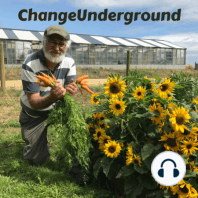7 min listen
44 #worldorganicnews 2016 12 12
ratings:
Length:
7 minutes
Released:
Dec 13, 2016
Format:
Podcast episode
Description
Links Perovskite solar cells hit new world efficiency record « Great Things from Small Things .. Nanotechnology Innovation http://wp.me/p5Cqpo-dzn Australia can get to zero emissions, as rooftop solar booms « Antinuclear http://wp.me/p5Cqpo-dBb Electricity Network Transformation Roadmap http://www.energynetworks.com.au/electricity-network-transformation-roadmap Detroit’s Sustainable “Agrihood” | Suzanne's Mom's Blog http://wp.me/p5Cqpo-dzF How soil is lost | Make Wealth History http://wp.me/p5Cqpo-dD0 **** This is the World Organic News Podcast for the week ending 12th of December 2016. Jon Moore reporting! This week we begin with news from the academy! Those curiously named solar cells perovskites have hit new efficiency levels. The blog: Great Things from Small Things .. Nanotechnology Innovation brings us the post: Perovskite solar cells hit new world efficiency record. Quote: They’re flexible, cheap to produce and simple to make – which is why perovskites are the hottest new material in solar cell design. And now, engineers at Australia’s University of New South Wales in Sydney have smashed the trendy new compound’s world efficiency record. End Quote. This is wonderful news. Non fossil fuel based energy is the way forward. After generations of research focused on fossil fuels, bright minds are now and have been for a while driving alternatives. Perovskites are quick and cheap to manufacture, increasingly efficient but do suffer from some stability issues in open weather. There are workarounds to overcome these issues. The increasing efficiencies may make these drawbacks irrelevant. The research continues and with it hope for the future. Even using “standard” PV cells it is possible to make great advances. The blog Antinuclear brings us a post entitled: Australia can get to zero emissions, as rooftop solar booms. Funnily enough if the price signals are sufficiently strong and the technology serviceable, individuals will make decisions which collectively benefit us all. This is what’s happened in Australia with rooftop solar cells. To such an extent, the CSIRO can see them as Australia’s pathway to zero emissions. Quote: Consumers using rooftop solar panels and batteries will produce between a third and half of Australia’s electricity by mid-century if the right policies are introduced, according to a roadmap from the CSIRO and power and gas transmission body Energy Networks Australia. The two-year analysis also found an emissions intensity scheme for the electricity sector – a form of carbon trading that was to be considered by a government climate policy review until that plan was abandoned on Tuesday afternoon – would be the cheapest way to cut carbon dioxide emissions. End Quote. The report suggested the entire electrical grid could be zero carbon emitting when rooftop solar is coupled with batteries by 2050. Whilst this doesn’t deal with road transport and other emitters of CO2, the grid is a great place to start. Now we move onto another great news story. Suzanne's Mom's Blog brings us the post: Detroit’s Sustainable “Agrihood”. Given the economic disasters which have befallen Detroit in the past thirty years, this post is one of great promise. As vast swathes of greater Detroit have been abandoned following the crisis of 2008, land has become available for alternative use. To be specific for food production. From the blog post: Quote: “This week, the Michigan Urban Farming Initiative (MUFI) revealed its plans for the first Sustainable Urban Agrihood in the North End. “Wait, an agrihood? It’s an alternative neighborhood growth model, positioning agriculture as the centerpiece of a mixed-use development. There are some agrihoods around the country, but in rural areas. This is the first within a city. End Quote. From the great pains of economic downturn comes the possibility of a better way to live. Food grown where it is consumed, employment, renewal and a future. I recommend a reading of the whole post. It is uplifti
Released:
Dec 13, 2016
Format:
Podcast episode
Titles in the series (100)
23 #worldorganicnews 2016 07 04: A new documentary "What's With Wheat?", Industria… by ChangeUnderground
